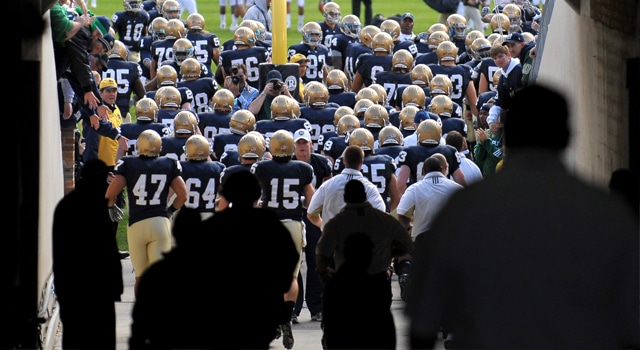

Growing up in a Methodist family and wanting to become a minister, Marv Russell’s early path did not seem to include a later stop as a football player at Notre Dame. A young man who dealt with adversity many times and at one point was diagnosed with dyslexia, Russell put his strong work ethic and determination to good use on the way to a successful football career and becoming a book author, keynote speaker, consultant and nationally known leadership expert in the business world. Russell now commutes between Chicago and Florida with his wife (and fellow Notre Dame graduate) Catherine. The couple has two grown children, Marvin and Angela.
Q: Growing up in football-rich western Pennsylvania, how did a school like Notre Dame end up on your recruiting radar?
A: “I grew up following such schools as Pitt, Penn State and West Virginia, but I got hooked on Notre Dame by listening to their Sunday morning broadcasts with Lindsey Nelson. (in the pre-cable TV era, edited replays of Notre Dame football games were aired on Sunday mornings.) I thought the school was interesting and very intriguing, and the Notre Dame mystique really drew me in. I grew up in a very staunch Catholic community. Once I started to experience some success playing football, everyone wanted to know if I wanted to go to Notre Dame. I really wanted to be a Methodist minister, but the idea of studying theology at Notre Dame was very inspiring to me, even though I am not Catholic.”
“I took very few visits to colleges, and when Notre Dame made me the offer to come play football there I said yes immediately. A month later they withdrew the offer because my grades and college boards were not up to par. Coach (Ara) Parseghian said to me in a letter that I was a great player, a solid person and have great values, but he added that my scores did not meet Notre Dame’s standards, and that academics were an integral part the university.”
“Meanwhile, Pitt, Michigan State and Ohio State were all chomping at the bit to get their hands on me, but I took a different path. With my parents’ support, I went to college prep school for a year after high school, took the college boards again, and got in to Notre Dame. While I was at Wyoming Seminary college prep school they diagnosed me with a slight case of dyslexia. They also taught me how to study, which made a big difference in my studying habits and in my academic success. Just a few adjustments= made such a huge difference for me. After you’ve been told not to come, and you make it anyway … that simple fact right there made being at Notre Dame even more special to me.”
“Going to college prep school was great for me. It helped me mature a great deal. My parents both took extra jobs to send me to prep school, and it was still a gamble as to whether or not I would actually get into Notre Dame, but it worked. When I got the final acceptance into Notre Dame, other academic institutions such as Bucknell and Colgate also offered me scholarship opportunities. Things really changed for me in that year. I went from being a great athlete to being a great student-athlete and Notre Dame was definitely where I wanted to be.”
Q: What was your biggest challenge at Notre Dame?
A: “When I got to Notre Dame and told them that I wanted to study theology, they told me that I was crazy. Not only did I have a learning disability, but theology was a difficult degree to be undertaking while also playing football. They did everything they could to talk me out of it, but I stuck to my guns. It took a great deal of effort for me to succeed both academically and on the football field, but I feel that I gained so much from that experience. I met a Notre Dame professor and his wife at one of my speaking engagements recently. When they realized I majored in theology as a student-athlete, they were shocked. That still makes me feel good.”
Q: What is your favorite Notre Dame football memory?
A: “Sitting on the bus, late on December 31 (or early on January 1), on the way back to the hotel celebrating that we had just won the National Championship an hour before. Unbelievable. Everyone else in the world was celebrating New Year’s Eve, but we had something extra special to celebrate.”
“Next to that, the first moment when you run out of the tunnel as a Notre Dame football player is quite remarkable. The first home game my freshman year, running out of the tunnel on that beautiful fall day was incredible. I can remember being so choked up, tears in my eyes. It was pure. When you go from the concrete and your spikes hit that grass cushion that is what you go to Notre Dame for. You think about all the students who go, or have gone to ND, about all of the people in the world, and that very few people actually have that experience.”
Q: What was it like playing on the 1973 National Championship team?
A: “As a freshman, and being one of the few freshmen who was able to play that year, it was a pretty special experience for me. I had never been on a winning team the whole time I played football. As we kept winning games I was thinking, ‘Wow … is this what it’s really like?’ When we played Southern Cal at home and won, that’s when we started to believe. We looked at the rest of the schedule, and how up to that point we were just dominating teams, and we just knew we could continue to roll. Our last game of the regular season was against Miami; we played them in the old Orange Bowl. Coach (Ara) Parseghian reminded us that we still had one more game to go, and that we had better not forget this team because we were in their house and were ripe for the picking. We had no problem beating Miami, but those are the games that tend to upset apple carts.”
“At the end of the season we were ranked third, and we went to the Sugar Bowl to play No. 1-ranked Alabama. Oklahoma was No. 2, but they were ineligible to play in a bowl game. There were three undefeated teams that year, and yet the championship game ended up being No. 1 playing No. 3. How fortunate were we? And we proved to the nation that we deserved to be there, narrowly defeating them in a tremendous game, 24-23.”
Q: You played for both Coach Parseghian and Coach Dan Devine? How would you compare the two?
A: “My leadership framework and philosophy, and the behaviors of leadership that I practice, all come from and were exemplified by Ara Parseghian. He was not a philosophical leader, but his style of motivation, engagement and inspiration took our performance to the next level. That was a unique skill that Coach Parseghian possessed, to be able to do that. He has told me that he thinks I give him more credit than he deserves, but I disagree. He was not a coach who demanded that you follow him, but rather you wanted to follow him because he inspired you, and gave you more strength and confidence than you ever thought you had.”
“Luther Bradley was so nervous before he started his first game. Coach Parseghian taps him on the back and tells him, ‘I would not put you in a circumstance if I didn’t think you could succeed. We are going to be there for you. Just be Luther Bradley and do what you do best.’ He had several interceptions that day. Ara did what Ara did best: Engagement … motivation … inspiration.”
“You can motivate people in many ways, but when you motivate them through inspiration, that’s the difference. You mind, body and soul all want to succeed.”
“We all knew Coach Devine was not going to inspire in the same way that Coach Parseghian had. Coach Devine was a strategic, philosophical kind of leader. He sat back and let his lieutenants do the engagement, while he was the leader who was successfully pulling it all together, molding the talent and creating an environment that led to that success. Those were Devine’s gifts.”
Q: Did you have any opportunities to play in the NFL?
A: “When I graduated there were two football leagues, the NFL and the World Football league. I had a chance to try-out with the Denver Broncos, but I turned it down due to the fact that I had just come off knee surgery, was recently married and had a child on the way.”
“The Chicago Blitz, from the World Football League, was very persistent in pursuing me. I went to their fall camp, but my heart just was not in it. I was not that big of a guy compared to the other linebackers. Mostly I went to camp to have the opportunity to experience it, but I realized that my heart, mind and soul were not in it. I knew the odds of having a successful professional football career were long. I did, however, run the 40-yard dash in 4.9 seconds … pretty impressive for a 5’11 240-pound linebacker in those days. I wrote about the experience in a local newspaper article.”
Q: Where did life take you after Notre Dame?
A: “My goal post-college was to save the world. I wanted to be the next Martin Luther King, Jr. I became a Methodist minister the summer after my junior year at Notre Dame, and was doing some work in a local church. My first job out of college was at South Bend Youth Services Bureaus, then I was as a probation officer for the St Joseph County Probation Department in Indiana. I was promoted from there to be the chief probation officer in Elkhart County Probation Department, and then the State Deputy Director for Indiana Civil Rights Commission. I loved working in social services, and I loved my job until a new governor got voted in and I lost my job.”
“At that point I landed a job as a Human Resources manager for a local company, Carrier Corporation, and I ended up seeing more success than I ever imagined I could in the human resources field. After working my way up the corporate ladder at several companies, including assignments living in Europe, I ended up as the Senior Vice President of Human Resources for Ascension Health Care, which is one of the largest Catholic health care organizations. The transition from social services to human resources was not difficult for me because the focus was still on people.”
“In the early days I pastored two churches, but when I took the human resources job, I found that my new career took up too much of my time and travel, and I was not able to dedicate myself the way I wanted to, to my churches. But no matter what career I was in, I always was a speaker. I went to law school for one year and ended up hating it because it took me away from my family too much. I also finished my Masters Degree while our kids were still little, which helped me move up the HR ladder.”
“After many years in corporate human resources and living and working as an expat nearly 10 years in Paris, France, and Copenhagen, Denmark, and traveling and working in nearly 30 countries, I decided to start my own company. I wanted to be that person who develops and motivates and inspires people. I knew that I was good in front of a crowd, so it seemed like a logical transition to me.”
“Then I wrote my book, ‘Linebacker in the Boardroom: Lessons in Life & Leadership,’ and my current path is as a leadership consultant. I speak to corporations, and inspire them to be better leaders. Being on stage is almost like running out on that field the first day. I am inspired and driven and feel myself at full capacity. Motivational speaking is a gift, and I love my gift. I try to do six to eight speeches a month. Inspiring people of all walks of life: leaders, young people, preaching on Sundays in a church, student- athletes, Notre Dame campus events and Alumni Club events … any chance I can get to inspire others.”
Q: What was it like writing your book?
A: “I had been talking about writing a book for years, when suddenly I felt it. I knew exactly what I was going to write. It just all started coming together. I wanted to write a book that really talked about leadership, but I also wanted it to be about my story of leadership and to introduce my leadership philosophy. I explain in the book how that leadership philosophy molds and shapes a person.”
“The most important thing for me is not necessarily the fact that I overcame the odds, but that I can use my experiences to inspire, mold and shape other people. Being successful as a student-athlete is one of the most difficult things you can do, especially at Notre Dame, and it is a big part of how I came to be the person I am today.”
“I am currently writing my second book, ‘Finding Your Impact Zone,’ a more in-depth look at leadership. I look at politicians in the media, how so many of them totally and completely are letting us down as leaders, and how integrity and trust matter in leadership. I challenge the leaders of the world to build their foundations on integrity and trust. This foundation consists of the 3 E’s – Essential (performance), Exceptional (performance), and Ethical (performance). You need to figure out what it is that you do as a leader that is essential to others, do it exceptionally and ethically, and then use it as a sustainable ability to lead others.”
Q: What advice would you give Notre Dame football players today as they prepare for life after football?
A: “The time that football players should be getting advice is when they come to Notre Dame, not when they are leaving. They should be looking at the Notre Dame experience as one that is going to last for the rest of their lives. Every day when I sit at Starbucks and write, someone comes up to me and says, ‘You played football at Notre Dame, right? You wrote that book, right?’ There is something special about who you are, when you are a product of Notre Dame.”
“Many of the players that played the 10 years before (current Irish coach) Brian Kelly don’t understand what they got from Notre Dame. They don’t get that even though they didn’t win many games, they still won a way of life. They won integrity, something that many of their peers didn’t walk away from college with.”
“What I would say to those college athletes who receive the gift of playing in the NFL is the lord giveth and he taketh away- just like that. NFL careers, they come and go so quickly. Only 3 percent of college athletes get in, and only 3 percent of them stay very long. They need to realize that the money they make in the NFL will most likely not sustain them for the rest of their lives, so you better have learned something in college to take you into your next career.”
“The downside of a pro career is that if you play for several years in the NFL, you have now lost several years that other people have had establishing their careers, so you are already behind the eight-ball. The NFL is nothing more than a stepping-stone for what happens next. You have to be ready. Notre Dame prepares you. It’s your job to take advantage of this opportunity.”
If you would like to learn more about Marv, the Keynote Speaker, Consultant and Author please check out his web site: marvrussell.com or follow him on twitter @marvrussell or @ndlinebacker
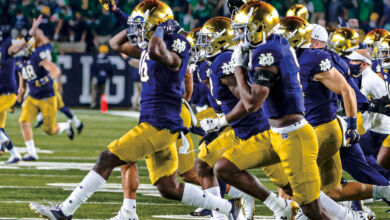
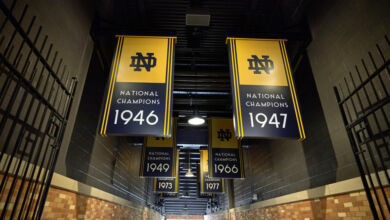
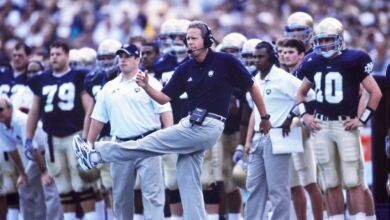
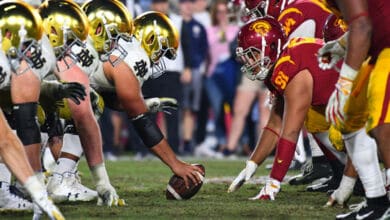
Ron,
To me Ishaq has been somewhat of a disappointment. I haven’t heard he’s injured. He’s been on the field. He’s just not standing out. Given the attention the D line gets from O linemen, Williams should be more of a factor in the opponents’ backfield. But he hasn’t been.
Recall that he played at a very low level of competition in HS. He also played DE in HS. It may take him a bit more time to adjust and have his game match his impressive physical traits.
Does anyone know what happened to Ishaq Williams? I haven’t heard his name. Is he hurt?
“What advice would you give Notre Dame football players today as they prepare for life after football?”
“THE OTHER HALF OF A MAN IS A WOMAN.” Jimi Hendrix
Especially if you ask “Hey Joe” hahahaha
I’m off topic
Go Irish
THB-You are adrift again. Hendrix was a drug addict and a terrible role model. And look what his antics got him…Stick to relevance.
Go Irish! Hooah!
THB seems to be stuck in gray fog…
Or is it a purple haze?
Q: “What is your favorite Notre Dame football memory?”
the last victory.